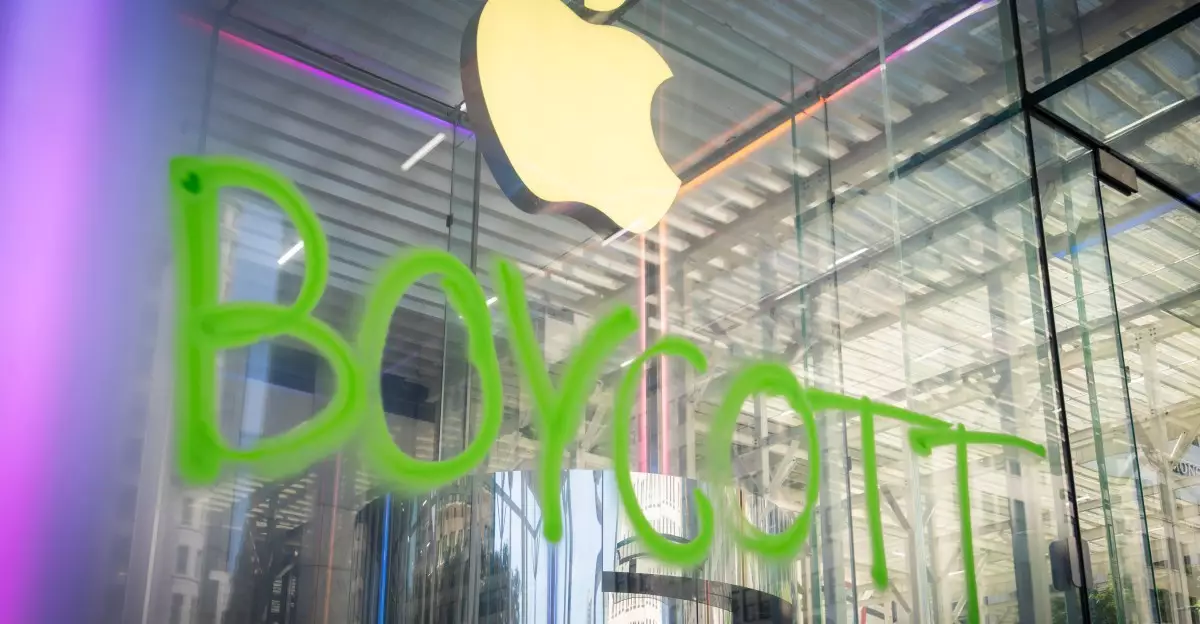In recent years, the spectacle of corporate climate commitments has become a frequent feature in the landscape of environmental discourse. Giants like Apple, Google, and Microsoft trumpet their sustainability efforts, often positioning themselves as champions of the planet. However, beneath these polished announcements lies a troubling disconnect—an insincerity that undermines genuine progress. The recent sabotage of Apple’s Fifth Avenue store by an Extinction Rebellion protester exemplifies this schism. The protest exposes a harsh truth: many tech corporations’ environmental claims are little more than cosmetic, designed more for public relations than real impact. When corporations publicly endorse climate action but simultaneously support policies or political figures undermining environmental protections, their motives come into question.
What makes this scenario particularly poignant is the contradiction at the heart of big tech’s image. They market themselves as innovators and protectors of the future, yet their associations with political figures like Donald Trump cast doubt on their genuine commitment. The protest’s message—”Tim + Trump = Toxic”—symbolizes this irony, illustrating how corporate leaders who claim to care about the planet are subtly complicit in policies that accelerate climate catastrophe. This performativity not only erodes trust but also distracts from meaningful action, reinforcing the urgent necessity for accountability and truthfulness in corporate environmental pledges.
The hypocrisy of alliances and the cost to democracy
The involvement of influential tech executives in political arenas is a critical aspect of this issue. When Apple’s Tim Cook and other industry leaders meet with administrations known for their rollback of environmental regulations, it sends a damaging message. It suggests that the companies prioritize profits and political influence over ecological sustainability. This alliance with powers that actively undermine climate progress reveals a troubling allegiance—a betrayal of both environmental ideals and democratic accountability.
Moreover, the protest highlights the peril of corporate complicity in political hypocrisy. The fact that these tech giants publicly tout their support for climate accords while privately backing administrations that threaten to dismantle such efforts exposes a strategic gap—one that allows them to sustain their business models unchallenged. The protesters’ chanting, “Dump Trump, Apple!” encapsulates this frustration and the urgent demand for integrity. Corporations cannot claim a moral high ground while navigating behind closed doors, engaging in political patronage that hampers the global fight against climate change.
Greenwashing and the hidden costs of technological growth
An intriguing aspect of this crisis is how the growth of technology, especially artificial intelligence, compounds environmental damage—despite corporate claims of sustainability. Reports revealing increased emissions from data centers of Google and Microsoft reveal that ambition often outpaces responsibility. These companies’ investments in AI, which is projected to consume vast amounts of power, threaten to undo progress made through their public green initiatives.
In this context, Apple’s support for climate action appears increasingly opportunistic rather than authentic. While Tim Cook emphasizes the significance of combating climate change, their financial ties and political endorsements tell a different story. The broader issue is the rise of greenwashing—where corporations craft a narrative of environmental stewardship to divert attention from the environmental toll of their core business practices, including energy consumption and supply chain emissions.
What this reveals is a troubling pattern: corporations are embracing the language of sustainability while their actions—be it supporting fossil-fuel policies or bolstering AI growth—contribute to the degradation of the environment. It’s an intricate dance of appearance versus reality, one that robs the movement for climate justice of its credibility and momentum.
The imperative for authentic activism
This entire episode underscores a vital lesson: for progress to be genuine, it must be rooted in transparency and unwavering commitment. Activism, whether from grassroots groups like Extinction Rebellion or critical watchdogs, plays an essential role in holding corporations accountable. The protest at Apple’s storefront isn’t just about vandalism; it’s a clarion call that exposes the chasm between rhetoric and reality.
The challenge now isn’t merely highlighting hypocrisy but pushing these corporations to adopt policies grounded in true sustainability—not corporate lip service—to actively support climate-friendly legislation and reduce their environmental footprint at every level. Only through meaningful action can the environmental movement hope to outpace the greenwashing that too often clouds corporate motives.
The protest’s message resonates: climate change is too urgent to be mired in superficial commitments. Companies must be willing to confront their own contradictions and prioritize the planet over profits. The future of environmental integrity depends on scrutinizing and exposing the gaps between what corporations say and what they do—something that activism and critical awareness are essential to catalyze.

